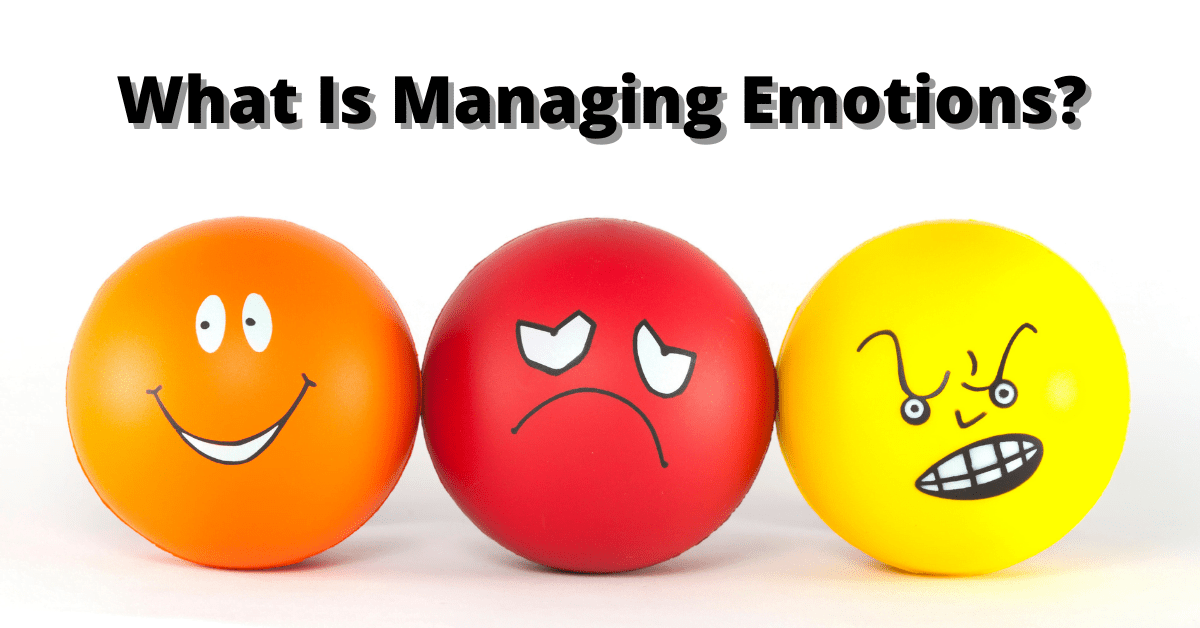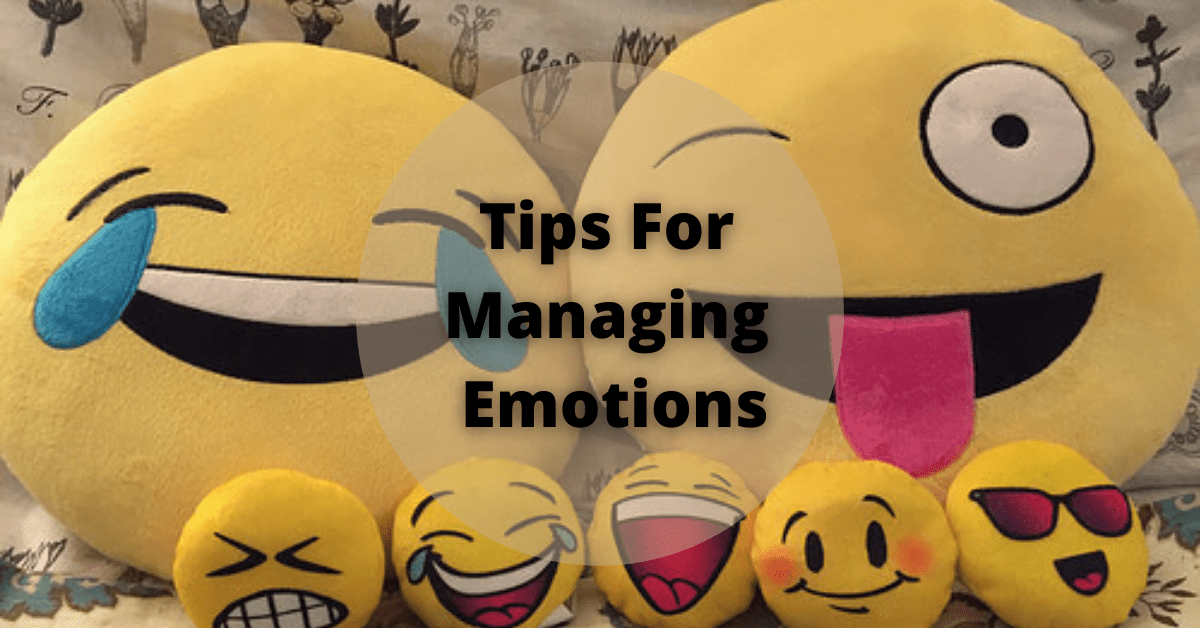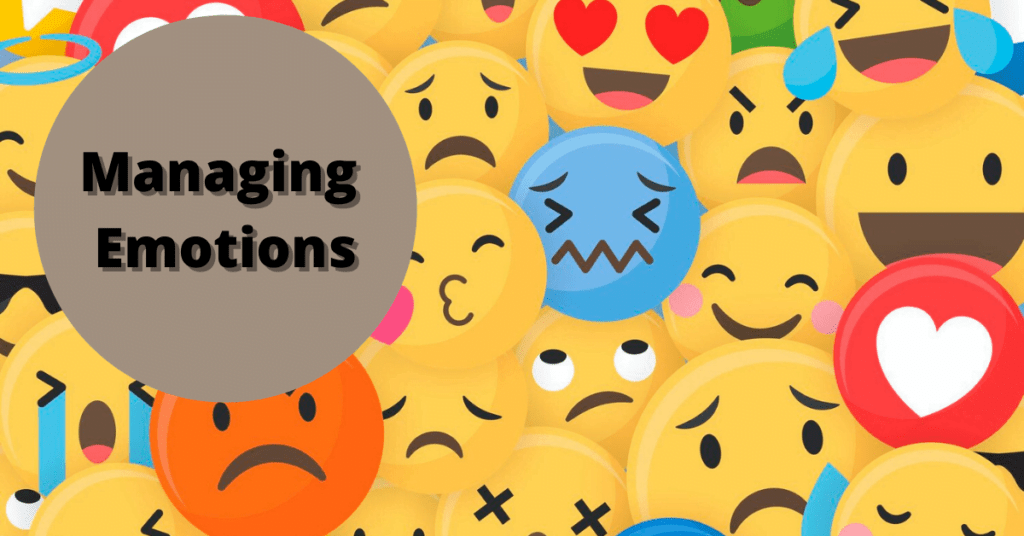Managing emotions is not easy. We live in a world where we are always told to control our emotions, but what does that really mean? There are many strategies you can use to manage your emotions. In this blog post, we will discuss 10 ways to help you manage your emotions and live more fulfilling lives!
Contents
- 1 What Are Emotions?
- 2 What Is Managing Emotions?
- 2.1 Tips For Managing Emotions
- 2.2 Stay Positive
- 2.3 Don’t Dwell On Negative Emotions
- 2.4 Write Out Your Feelings
- 2.5 Don’t Let Negative Emotions Control You
- 2.6 Smile More
- 2.7 Be Patient With Yourself
- 2.8 Identify Your Triggers
- 2.9 Try To Meditate
- 2.10 Remember the People Who Matter Most
- 2.11 Take Some Time for Yourself
- 2.12 Don’t Be Afraid to Ask for Help
- 2.13 Start Practicing Mindfulness
- 3 Benefits of Managing Emotions
- 4 Conclusion
What Are Emotions?
 Emotions are the feelings everyone experiences. Every day, the brain is constantly processing information and reacting to what it learns through emotions. They can be about anything: objects, people, ideas, or events that happen around us (or in your heads). What’s important for you to remember is that all of these emotional experiences will ultimately affect your mood and could trigger other physical responses such as a headache or upset stomach due to stress levels getting too high.
Emotions are the feelings everyone experiences. Every day, the brain is constantly processing information and reacting to what it learns through emotions. They can be about anything: objects, people, ideas, or events that happen around us (or in your heads). What’s important for you to remember is that all of these emotional experiences will ultimately affect your mood and could trigger other physical responses such as a headache or upset stomach due to stress levels getting too high.
What Is Managing Emotions?

Managing emotions is the process of understanding how certain emotional experiences can influence your mood. As humans, we have an innate need to be accepted and liked by others in social situations, but that doesn’t always happen. When it doesn’t, you may feel sadness or anger about not being included—or rejection from someone else. That’s why managing emotions is important because they could lead to other issues within yourself or with those around you if left unchecked.
Tips For Managing Emotions

Here are ten tips for managing your emotions:
Stay Positive
Staying positive doesn’t mean you have to be happy all the time. It just means that when things get tough, remind yourself of what’s good in life and focus on those aspects instead of only looking at the negative side.
Don’t Dwell On Negative Emotions
Everyone experiences negative emotions from time to time. But letting them linger will make it harder for you to move forward with solutions or ideas about how to feel better again soon. If something is making you sad or angry, allow yourself a little bit of extra time (maybe 15 minutes) before moving on. This is because dwelling too long can put unnecessary stress on your body if left unresolved.
Write Out Your Feelings
Similar to not dwelling on negative emotions, it’s important to write them down. This is when you experience something upsetting. Writing your feelings is a great way of getting rid of the negativity in your life and focusing more on what makes you happy instead. Of course, this won’t work for everyone who experiences negative emotions. It is because some people can hold onto their sadness or anger longer than others. You might be able (or willing) to let go of that same feeling after writing about it.
Don’t Let Negative Emotions Control You
Everyone has emotional triggers. This is even if they don’t realize it right away—and letting these issues control how you think and act is never good. Instead, try identifying what kinds of things trigger certain negative emotions. This is so that you can proactively decide to avoid them in the future.
Smile More
This tip is easy enough because it’s not about anything complicated. Smiling more can help you manage your emotions better by helping reduce stress, anxiety, and anger when you act on what makes you happy instead of dwelling on negative feelings that could get worse with time if left ignored or unresolved. For example, if someone at work has been making snarky comments towards you (and they always seem to come right before lunch), give yourself a moment to calm down after their rude comment. You can then go eat something good for your body. Even if it means getting some fresh air outside for a few minutes so that you feel calmer overall afterward. Don’t let anyone else control how you feel about your life.
Be Patient With Yourself
Everyone makes mistakes, and that’s okay because no one is perfect. Being kinder towards yourself can help reduce negative emotions by being patient with what happens in your daily routine. This is especially when things don’t always go as planned even if it wasn’t something you were directly responsible for. If someone else messes up at work or forgets their share of the bill on a night out, try not taking it personally. This is so that you won’t experience unnecessary stress over something that isn’t entirely under your control. Pro tip: instead of getting upset at others who have let you down, celebrate the accomplishments they’ve made. This is regardless of how big or small they might seem.
Identify Your Triggers
Everyone has different triggers for negative emotions, and knowing what causes you to experience worrisome feelings can help reduce them in the future. This is because you know why your mood changed all of a sudden even if it wasn’t something within your control. For example, someone at work told you about an opportunity that will take up more time than expected. Once you identify these emotional triggers, think about the appropriate actions you need to take. This is so that they don’t happen again. It is even if their cause was completely unexpected or out of thin air. For example, asking yourself “why?” after getting upset over something is important when unnecessary stress does occur. This simple act allows everyone to move forward with finding solutions. It is instead of staying stuck on bad habits.
Try To Meditate
If you’re having a hard time managing your emotions, meditating can be helpful for reducing stress and anxiety. It is by making room in your mind to let go of everything that’s going on around you at any given moment. This is no matter how big or small the problem might seem when it shows up unexpectedly. Meditation is one way of describing what happens when people clear their minds from unnecessary worries. This only adds more pressure without actually solving anything in life. It is because they’ve been left unattended for too long. At its core, meditation is about giving yourself mental space away from all the noise. This is so that you can find better clarity with whatever problems happen next. It is instead of getting lost within them until it feels like there’s no way out.
Remember the People Who Matter Most
Not everyone who walks into your life will be around forever. That is why it’s important to remember how much they have taught you about what matters most in life. This is instead of staying upset at them for things that are completely within their control. If someone makes a mistake, try forgiving them. This is because holding onto resentment is only going to hurt both of you without actually solving anything along the way. It is no matter how big or small that problem may have been when it first occurred.
Forgiveness might feel like saying goodbye to another person. This is even if they were good friends with strong ties but all relationships end eventually. It is instead of letting this relationship drag on until there’s nothing left between each other. Do your best to cherish the time spent together. This is because that’s what will remain in your memories instead of bad feelings.
Take Some Time for Yourself
No matter how much you love doing activities with other people, sometimes taking some alone time is necessary. This is for managing negative emotions by being introspective enough to reduce stress without anyone else around. It is especially when life gets too busy and there are no opportunities left to take care of yourself. This is until it feels like there’s nothing left within you anymore. Take this opportunity away from others so that you can clear your mind about everything going on right now. This is whether or not their presence was completely expected or out of thin air. You can use this newfound solitude as a chance to recharge. It is while also catching up on the things that matter most in life because you deserve this time away, too.
Don’t Be Afraid to Ask for Help
No person is an island unto themselves even if they don’t always feel like it’s necessary to ask others for help when problems happen throughout daily life. This is even though everyone needs a little bit of assistance every once in and while. You can use your support system as a way to catch up with how everyone else is feeling about what matters most. This is instead of keeping all these feelings within yourself. Sometimes asking for help means opening communication lines between each other so that people can talk more openly about their lives without having any reservations; not only does this make it easier to share feelings with each other, it’s also a good way of managing problems as soon as they arise instead of letting them fester within you until there’s nothing left but resentment and bad feelings.
Start Practicing Mindfulness
No matter how busy your life might be right now, practicing mindfulness is one way of making room for all the things that matter most in daily life—no matter how small or big these emotions happen to feel when they show up unexpectedly (this goes back to writing down feelings). Being mindful can help reduce stress by simply slowing everything down so that people have time away from their thoughts without any interruptions; use this newfound silence between all those unwanted distractions throughout day-to-day life as an opportunity to get in touch with your feelings and what’s going on right now without letting these problems fester within yourself because that will only make things worse for everyone involved.
Benefits of Managing Emotions

Managing Emotions helps you in many different ways. Some of these are:
Reduces Stress
Managing Emotions helps you reduce stress by being mindful of your surroundings without any interruptions.
Enhances Communication
Managing emotions enhances communication between people so that they can talk about what’s going on in their lives instead of keeping these feelings within themselves until it becomes too much to handle at once—no matter how big or small the problem is when it first arises (this goes back to writing down feelings).
Increases Productivity
Managing emotions increases productivity by maintaining a balance between work and home life.
Increases Creativity
Managing Emotions helps you increase creativity when taking time for yourself away from other people so that you can reduce stress in your life without being surrounded by constant chaos every day of the week (this goes back to writing down feelings).
Conclusion
Emotions play a huge role in our decision-making process, and it is important to understand how we typically react to certain stimuli.
Managing emotions isn’t easy. It takes a lot of self-reflection and works to understand your own feelings, as well as the feelings that people around you experience. When someone is going through a difficult time, try not to make it worse by saying something insensitive or upsetting them more than they already are. Instead, offer support in whatever way possible – whether it be listening to their venting session for hours on end or simply lending an ear when needed.
Remember that managing your emotions doesn’t always mean bottling up everything inside and never letting anything out; sometimes sharing what you’re feeling can help relieve stress and improve mental health just like any other form of exercise does.
If you are looking for affordable Online Counseling MantraCare can help: Book a trial therapy session


